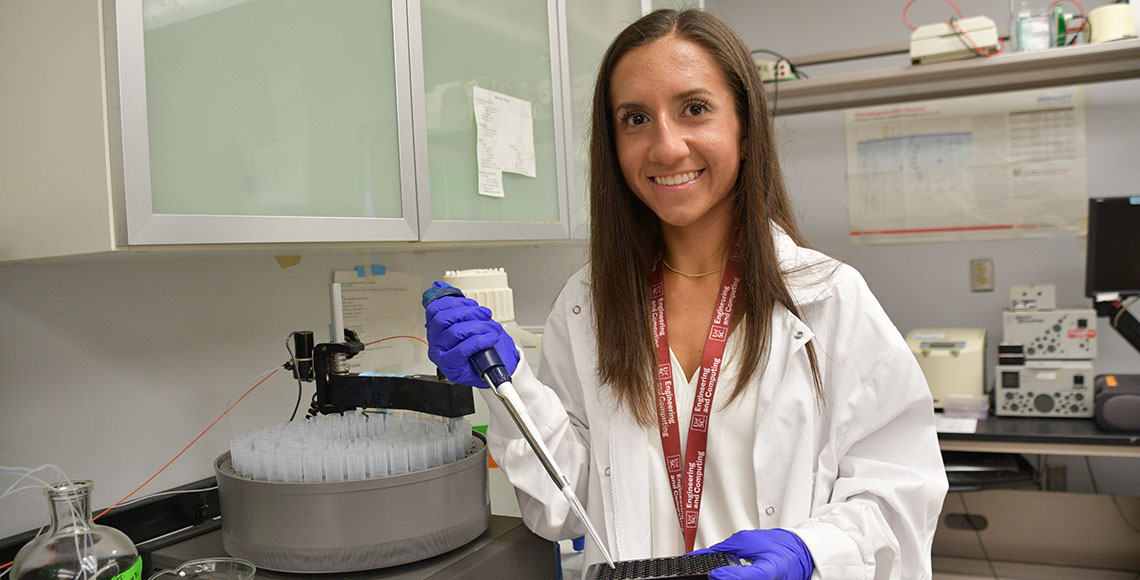Biomedical engineering (BMEN) doctoral candidate Amy Veihdeffer is on a mission to advance the treatment of Alzheimer’s disease, a degenerative brain disease affecting more than 55 million people worldwide. Her research is focused on the amyloid-beta peptide aggregation pathway and aggregation inhibitors as a potential therapeutic for the illness.
Veihdeffer’s research interests are rooted both in a personal connection, as her grandmother suffered from the disease, and a deep respect for the work of the college’s Protein Aggregation and Neuroinflammation Laboratory, directed by Professor and Department of Chemical Engineering Chair Melissa Moss.
“I am interested in the molecular engineering side of biomedical engineering and learned about Dr. Moss’ lab when I was a senior in college,” Veihdeffer says. “I found it to be groundbreaking work for a disease that is extremely prevalent. Dr. Moss’ work is what led me to choose the University of South Carolina for graduate school.”
Veihdeffer earned her undergraduate degree in engineering from James Madison University in 2022 and is pursuing her master’s and doctorate degrees simultaneously. She is scheduled to receive her Ph.D. in 2026.
“It is interesting that my master’s work is informing my Ph.D. work,” she says. “My master’s is focused on studying the amyloid-beta protein storage and understanding how the protein changes over various storage times and temperatures. This will help ensure I’m using the best possible protein product when conducting my Ph.D. experiments.”
While waiting for the proteins to age in storage, Veihdeffer studies protein aggregates, which create an excess of fibrous brain tissue in Alzheimer’s patients. She is also testing peptoids as a means of inhibiting the amyloid-beta effects of aggregation and therefore decreasing the time until aggregation starts. By delaying aggregation, she hypothesizes that researchers can extend the progression of Alzheimer’s.
“I was delighted when Amy joined our research team two years ago. She has been working to characterize a novel inhibitor of amyloid-beta protein aggregation, a hallmark of Alzheimer’s disease,” Moss says. “It has been a pleasure to watch Amy’s research skills grow. Her interest and excitement for the work have propelled her to gather data that demonstrate the therapeutic potential of this inhibitor.”
Prior to USC, Veihdeffer developed her interest in biomedical engineering during a two-year co-op with Merck, which she completed in June 2023. Working as an automation engineer for the pharmaceutical company, she gained skills in data science and analytics to include processing time series batch data, building custom reports for end users, managing change controls and data validation. The experience helped guide her career path, honing her interest in the formulation, rather than manufacturing, of therapeutics.
“Having this experience in the pharmaceutical industry helped me understand that I want to do more work on the drug creation side rather than the drug manufacturing side,” she says. “It helped me decide that I want to pursue jobs in industry but that I need further education for the job I want, which involves leading a lab or research team with a drug development company.”
In addition to her co-op and work alongside Moss in the lab, Veihdeffer’s professors at the Molinaroli College of Engineering and Computing have influenced her path in biomedical engineering. In particular, she has benefitted from the support and guidance of Associate Professor Shekhar Patel and Mark Uline, interim chair of the Department of Biomedical Engineering, who is also her co-advisor.
“Dr. Moss has been absolutely incredible,” Veihdeffer says. “She is supportive and great at troubleshooting errors but can also be hands off and let you discover things on your own. I could not be more thankful for her.”
While Veihdeffer explains that entering the biomedical engineering graduate program with a general engineering undergraduate degree hasn’t been easy, she credits Uline with easing the adjustment to graduate school and Patel, her professor of intensive molecular biology, with helping her build the biology base needed for her program.
“BMEN is a challenging frontier covering a broad spectrum of academic disciplines and requiring a deeper understanding of interconnecting sciences,” Patel says. “Amy came to us genuinely interested in pursuing research in BMEN and has proven to be a quick learner as she successfully navigated through the demanding coursework. We believe Amy has great potential to achieve her academic goals.”
